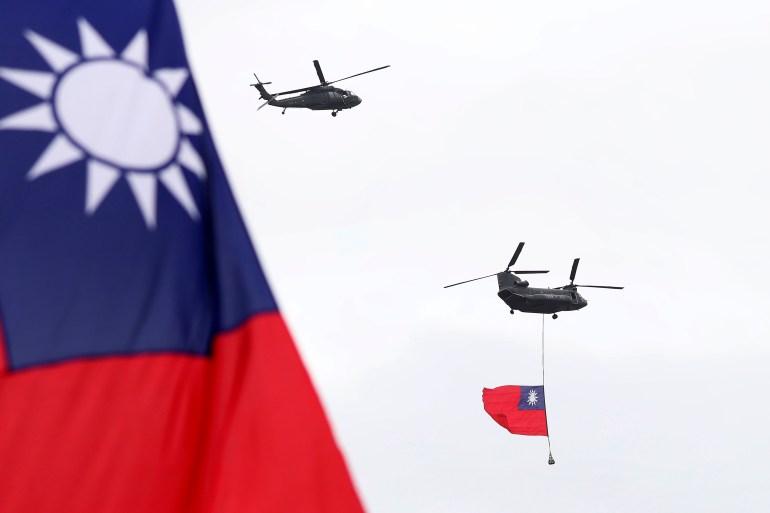US calls off UN envoy’s Taiwan visit to focus on Biden transition
Taiwan says it ‘respects’ US decision, but analysts say island might be quietly relieved.

A trip by Kelly Craft, the US Ambassador to the United Nations to Taiwan this week was cancelled suddenly on Wednesday after the Trump Administration called off all official engagements as part of its transition efforts to help US President-elect Joe Biden.
Craft was due to begin the three-day trip on January 13 and was scheduled to meet the island’s president Tsai Ing-wen.
Keep reading
list of 4 items‘Big thing’: Taiwan welcomes US move on official interactions
‘A cudgel against Beijing’: US ambassador to UN to visit Taiwan
‘Cheap trick’: China rebuffs Taiwan’s latest offer for talks
Announced as part of a wider criticism on the arrest of 53 democracy activists in Hong Kong, the trip had come under scrutiny at home and abroad for its timing so close to Biden’s inauguration next week.
Some critics were concerned that it would poison the waters for the Biden administration’s relationship with China after relations between the two countries deteriorated sharply under Trump.
China had also warned the US would pay a “heavy price” for the visit to Taiwan. Beijing considers the democratic island of 23 million part of its territory in a conflict that dates back to the late 1940s.
On Wednesday, Taiwan Ministry of Foreign Affairs Spokeswoman Joanne Ou said in a statement that Taiwan “regrets” Craft would be unable to visit but welcomed her to “visit at any point in the future”.

Some analysts, including Bonnie Glaser, a senior adviser for Asia and the director of the China Power Project at the Center for Strategic and International Studies, said that Taipei might actually be “somewhat relieved” by the trip’s sudden cancellation.
“Taiwan doesn’t want to create friction with the incoming administration. They would have preferred if this visit had taken place several months ago,” she told Al Jazeera.
While Craft’s trip would have been the first by a serving US ambassador to the UN, Taiwan last year played host to Secretary of Health and Human Services Alex Azar and Under Secretary of State Keith Krach. Both visits were condemned by China which stepped up military manoeuvres in the area while the men were in Taiwan.
Controversy also did not keep the State Department from a blockbuster announcement on Saturday that it would lift “self-imposed restrictions on interactions between State Department staff and their Taiwanese counterparts”.
The announcement has given more power to the American Institute in Taiwan, Washington’s de facto embassy in Taipei to set meetings with the Taiwanese as opposed to following the lead of the State Department in Washington, DC.
It is uncertain, however, how long these changes will remain.
“The United States government took these actions unilaterally, in an attempt to appease the Communist regime in Beijing. No more,” outgoing US Secretary of State Mike Pompeo said in a statement announcing the decision. “The United States government maintains relationships with unofficial partners around the world, and Taiwan is no exception.”
The US does not maintain formal diplomatic relations with Taiwan, but under the 1979 Taiwan Relations Act has agreed to help Taiwan with its self-defence.

The US Congress has also moved to deepen its relationship in recent years through the Taiwan Assurances Act, which was signed into law in late December, and the Taiwan Travel Act, which paved the way for official visits in 2018.
Under the Trump administration, US-Taiwan relations have been their strongest in decades but many critics say Trump was merely making use of Taiwan to provoke China’s ruling Communist Party.
While many Taiwanese are concerned about their diplomatic future under a new president, Michael Mazza, a visiting fellow at the American Enterprise Institute, says Biden might be willing to maintain some of the room for manoeuvre carved out by Trump.
“I would be surprised if the Biden administration reinstitute the Taiwan guidelines that Secretary Pompeo just nullified,” Mazza said. “The Biden administration could continue to unofficially abide by those guidelines if it wants to tread very carefully. But I think it is more likely to take the opportunity to regularise diplomatic interactions with Taiwan. That doesn’t mean [President] Tsai Ing-wen will be invited to Washington any time soon.”